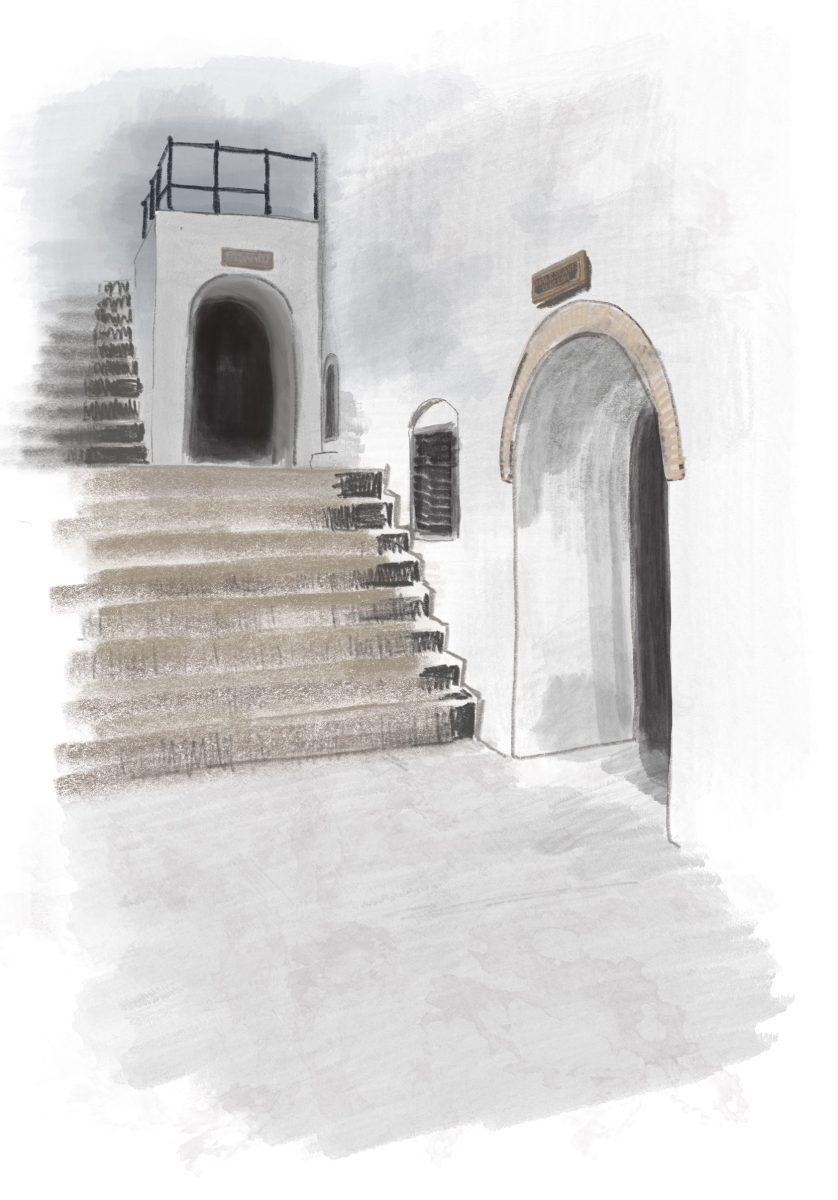A forest green prison transport van stopped at the Lane County Community Corrections Center on a sunny January day in 2014. A correctional officer opened the door. Jordan Rahier stepped into the crisp winter air, a maroon prison uniform covering his large frame. His handcuffs were taken off, and he walked into the square brick building.
This was Rahier’s fourth time in prison, but the last 31 months had been especially hard. His family was tired of him getting locked up. Rahier’s mom said that she wouldn’t talk to him if he went to prison again. And this time he was in, his mom didn’t send him birthday cards. Rahier called her every Friday for two and a half years. She never picked up.
This time, Rahier really didn’t want to go back.
Then 36 years old, he’d never held a real job. Rahier had a wife and five kids but they didn’t see him often. He was too busy selling cocaine and methamphetamine, running with gangs and getting in high speed chases with the police. From the time he was 20, Rahier had never stayed out of prison for more than a couple of years.
Many people in the United States are familiar with Rahier’s struggle to stay out of prison. Out of the 650,000 people released from U.S. prisons in a year, 70% are arrested again within three years, according to the Bureau of Justice Statistics. People coming out of prison need social support and housing to help them successfully transition. These services are rare, but some people in Lane County are providing help to ex-prisoners and reducing recidivism rates.
People coming out of prison have a hard time transitioning because many have responsibilities that other people don’t, says Paul Solomon, the executive director of Sponsors Inc., a Eugene organization that provides housing and support to ex-prisoners. These responsibilities include meetings with parole officers, drug and alcohol treatments and job search.
Sponsors is one of the only one-stop transitional service organizations in the country, mainly funded by contracts with Lane County and the state of Oregon. The organization prioritizes people who are at a high risk of reoffending. Its guiding philosophy is “that people can and do change, and that interventions at the appropriate times can serve as a catalyst to lasting change,” according to the website.
Over half of the people who work at the organization have been incarcerated, including himself and other managerial staff, Solomon says. And many once went through the Sponsors program.
It’s an organization run by felons for felons. This makes the relationships in the program feel more equal, Solomon says. Participants don’t feel judged because everybody’s been in the same place.
Rahier, having been to prison multiple times, had a high risk of reoffending and was the perfect fit for Sponsors. Solomon called Rahier and other people with high risks of recidivism while they were in prison and offered Rahier a spot in Re-entry Lane, a Sponsors program that allows prisoners to leave prison 60 days early. He accepted.
“Until I got that phone call, I didn’t know what I was going to do,” he says. “I was prepared for it to go either way when I got out.”
This time out of prison, he’d have drug and alcohol rehabilitation, help finding a job that wasn’t selling drugs and a peer mentor, all part of the Sponsors program, all things that Solomon says are helpful to successfully transitioning from prison.
Housing
The plan was for Rahier to complete the 60-day Re-entry Lane program, working at Sponsors during the day and spending nights in the Lane County Community Correction Center. Then he would live at the Sponsors men’s campus for another 60 days, in one of the organization’s 200 transitional housing units that serve around 1,000 people coming out of Oregon prisons every year.
The homes at the men’s campus are newly built, brightly painted maroon, cream and light brown. Each building contains five double rooms, a spacious shared kitchen and a living room with couches and a television.
“This facility is the nicest building anywhere in the neighborhood. It’s beautifully landscaped. The rooms are nice,” Solomon says. “It’s a contradiction to what people experience in prison.”
The goal by the end of the program, Solomon says, was for Rahier to move into a place of his own that he could pay for, have a stable source of income and be drug and alcohol free. But he had a long journey ahead.
Social support
Kimberly Howard, a 61-year-old Springfield native, was also a Sponsors participant. Howard struggled with depression and a meth addiction from her thirties until she was imprisoned in her late 50s for stealing.
Howard was released from Coffee Creek Prison in Wilsonville, Oregon, on an overcast March day in 2016. Her daughter picked her up. They went to IHOP for her first meal. She ordered chicken strips — her first meal that wasn’t prison food in two and a half years.
But Howard couldn’t eat. She was too anxious about what could happen to her now that she was free. Howard was nearly 60 years old then, and she was scared nobody would hire her at that age. She also had creeping fears that she’d go back to taking meth.
“It was overwhelming to be free,” Howard says in her soft, worn voice.
But knowing that transitioning would be hard, she’d applied to the Sponsors’ women’s program while she was in prison and secured a spot before she got out. When she arrived at the organization’s women’s campus, she says she felt safe. Howard would be starting three months in a supported environment where she could work through her problems.
It took her a few months to readjust to life outside of prison. Howard says being in crowds felt uncomfortable after spending years behind bars. She’d sometimes have to get off public busses and walk when too many people got on. And it took her months to build up the courage to shop at a grocery store. But she slowly regained her confidence through the program. Howard says talking to her case manager about her struggles helped.
“You need to talk about your issues, or else it’s going to build up,” she says.
Howard is now seven years clean from meth, and she’s three classes short of getting a Certified Alcohol and Drug Counselor certificate from Lane Community College.
The program worked for her. Howard wanted to share it with others; she’s been working at Sponsors as support staff since May 2018.
“I knew that I wanted to help people when I was in the program because it’s a struggle when you’re in recovery,” Howard says. “You need a lot of positive feedback and somebody to talk to.”
She says she’s good at helping people in Sponsors, because she understands their struggles with staying clean and adjusting to life on the outside.
Chip Keiger has been a mentor at Sponsors for eight years. He says equal relationships, like the ones Howard has with program participants, are helpful for ex-prisoners because they help them find self worth and take ownership of their decisions.
“Most of their previous lives have been a succession of different sorts of relationships based on inequality,” Keiger says, talking about his mentees.
He says they were used to being told what to do their whole lives, by parents, teachers, police and correctional officers.
“A lot of the guys I’ve worked with are used to being in relationships with people where they feel like they’re on the bottom rung,” Keiger says.
He says he wants equal relationships with his mentees by trying to avoid judgment whenever possible. Keiger lets his mentees have equal say in deciding what they do together.
He also drives them to Alcoholics Anonymous meetings, job interviews and to meet their parole officers—the many duties of ex-prisoners that can be overwhelming without help. None of his mentees have had cars upon release. If all goes well, he tells them to use him as a reference for job and housing applications, which can be hard to pass for felons.
Out of the seven people who Keiger has mentored, he’s still friends with five. One of them is disabled and unable to work, but the other four are employed. Only one was reincarcerated, 60 days for a misdemeanor, after the program.
Parole
The Lane County Parole and Probation office collaborates with Sponsors to fight recidivism. When people come out of prison, Sponsors staff and parole officers assess them to figure out what services they need to succeed.
“We’re identifying gaps in motivation, substance abuse and chemical dependency and we’re able to provide those services,” manager of Lane County Probation and Parole Donovan Dumire says.
Services offered at Sponsors include classes that help participants stay out of prison by addressing criminal habits, drug and alcohol classes, mental health counselling and parenting classes.
There’s a parole office at the Sponsors men’s campus. This makes meeting with parole officers easy for participants who might otherwise struggle to get to meetings. Dumire says his office takes an active role in rehabilitating people by working with Sponsors to give ex-prisoners social services — a new approach to parole and probation.
These re-entry services save the criminal justice system money. Oregon had nearly 15,000 adults in jail or prison in 2018. People in jail or prison each cost the system around $108 every day — $40,000 every year — from 2015 to 2017, according to Oregon Department of Corrections data.
The criminal justice system saved around $14 for every $1 it invested in re-entry programs including Sponsors in Lane, Multnomah and Klamath Counties in 2010, according to one Oregon Criminal Justice Commission report. People in the programs had a 31% lower rate of new criminal charges, and didn’t wind up in expensive jails and prisons as much as those without support.
Dumire says when he started his career as a parole officer in Marion County in 1997, his job was to enforce conditions of parole and to punish people. He says Lane County now focuses on building relationships with clients, because the old system didn’t help people stay out of prison and didn’t save the criminal justice system money.
Dumire says a good parole officer should be a counselor and role model, somebody who motivates parolees to change their ways. He says his office is more lenient now, and focuses more on rehabilitation than enforcement.
For example, if a Sponsors participants fails a drug test, they don’t automatically get kicked out of the program or put in jail. Sponsors and Dumire’s office work together in these instances to intervene and try to get them back on track.
“Jail does not do much for rehabilitation,” Dumire says. “We absolutely believe in second, third, fourth, fifth, sixth, seventh chances.”
Transitioning without support
But he says this level of support is rare in Oregon. When Dumire worked in Marion County, there were halfway houses for ex-prisoners, but no social services. Without supported housing, people would wind up committing crimes with their fellow ex-prisoners, and Dumire says he would have to constantly police them.
Sponsors participant Rahier has personal experience with unsupported housing. He recalls being in a transitional housing program in Multnomah County in the late 1990s. There was no staff on site, and residents used drugs in the building. Located a few blocks from the downtown Portland Greyhound station, Rahier says it was the perfect place to score dope — and the worst place to transition from prison.
He says this lack of services is still the norm in Oregon. In one instance, Rahier says somebody he was in prison with was put into a hotel in Marion County by the Department of Corrections after getting out of prison. The man bought heroin from somebody staying in the hotel the second night he was there.
“The place where DOC sent him when he got out was also the place where he bought the heroin that he OD’d and died on,” Rahier says.
Rahier says hotels are a common but ineffective type of transitional housing used by the Department of Corrections.
Lack of support is typical in the United States, Solomon says. He receives around 50 letters a week from people who want to enroll in Sponsors. A third of them don’t even live in Lane County but write to Sponsors because there’s nothing available where they live. Solomon says he regularly travels to consult people about transitional housing across the country.
A few hundred miles down the West coast, in Oakland, California, Randall Gutschenritter didn’t have the support he needed when he got out of prison.
Gutschenritter was incarcerated for most of his life. He was imprisoned for an armed kidnap and ransom when he was 24 years old in 1985, and was kept there until he got out in November, 2016, at 56 years old.
Having spent so much time in prison, transitioning was difficult for him. Like Rahier, he had a high risk of reoffending. Gutschenritter was the type of person that Sponsors would have prioritized if he lived in Lane County.
He was put in a transitional housing complex in Oakland, California, as a condition of his release. But Gutschenritter says the halfway house was cramped and didn’t offer much social support. He says it felt like a continuation of his prison sentence.
“There were 18 dudes in one room, packed in there like fucking sardines,” he said this summer while breaking parole, sitting at a table outside a coffee shop in downtown Oakland, rolling and chain-smoking Bugler cigarettes. “There was no air conditioning, no lights. It was ridiculous.”
Gutschenritter says people couldn’t leave the house without asking permission, and a barbed wire fence kept participants from escaping. He says it felt just like prison.
There was also very little supervision, Gutschenritter says. His roommates often shot up heroin and smoked crack cocaine and meth in the room. Afraid that he would wind up using drugs or getting into a fight, Gutschenritter broke parole by leaving the house and became homeless.
“It’s really hard to get out of a prison mentality after 31 years in there,” Gutschenritter says. “I wish I had counselling, and somebody to talk to when things got hard.”
Being homeless was painful for him and he says he struggled to stay sober. Gutschenritter started using methamphetamine again and became suicidal, tired of being beat down by a system that he felt was setting him up to fail and wind up back in prison.
“I damn near killed myself twice,” Gutschenritter says. “I’d had enough.”
During his time in prison, Gutschenritter had worked hard to prepare himself for release. He got auto mechanic and plumbing licenses. He took computer and business classes.
When Gutschenritter spoke with Ethos in August, he said he felt like all his work in prison was a waste of time because it wasn’t helping him succeed in the free world.
Finding worth
After Rahier walked into the Lane County Community Center and entered Sponsors’ Re-entry Lane program, he worked to unravel deep seated insecurities.
“I’m covered in tattoos from head to bottom. I felt like everybody always saw me as a dirtbag,” Rahier says. “When you walk into Sponsors for the first time, you’re not going to feel like that.”
After finishing Re-entry Lane, he got a job dishwashing evenings at a restaurant and did the Sponsors program, taking group therapy, drug and alcohol and parenting classes.
When he finished the program, he didn’t know what to do with his days. Rahier started volunteering at Sponsors, worried he’d go back to criminal habits left on his own. He knew he’d be safe at Sponsors.
After a year of volunteering, he was hired as on-call night staff. Rahier realized he could help people despite his criminal past. He started finding worth in himself. Rahier says he “worked his ass off,” and kept getting better positions.
Five years after Rahier stepped out of the prison transport vehicle and had his cuffs taken off, he works full time as the director of Sponsors men’s program. He has around 15 employees and 100 ex-prisoners in his care.
“This place worked for me,” Rahier says. “We teach you how to love yourself. And most everybody, myself included, who comes through here don’t care about themselves.”
He says he never wakes up dreading work at Sponsors. Rahier says around half of the participants are people he knew from the prison or from the street, and he loves giving them a new chance.
“The thirty years wasn’t a waste. It was fucked up. I did fucked-up shit. I spent most of my life away from my family,” Rahier says. “But without that, I wouldn’t be able to help these guys. I found out that I like to help people. For the first time in my life I felt like I had something to offer somebody other than a bag of dope.”
Illustration by Christina Staprans









![[Photo Courtesy of the Lara Family]
Ruben embraces his beloved childhood goat, Katrina.](https://ethos.dailyemerald.com/wp-content/uploads/2025/05/katrina-1-1060x1200.jpg)


